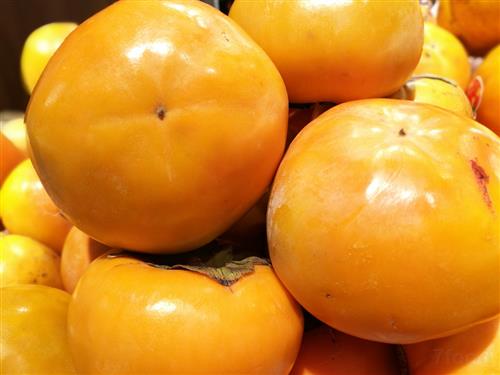Eating Persimmons in Winter Must Be Vigilant for Five Points
There is a saying: In July, the pomegranate August pears, September persimmons were yellowed, and the persimmons, which were abundant in September to December, were treasures; according to reports, eating persimmons can enhance immunity, beauty, and prevent aging.
What is the nutritional value of red persimmon? Persimmon is rich in beta-carotene, vitamin A and C, especially vitamin C is 1 to 2 times higher than the average fruit. Persimmons also contain carbohydrates of 17% or 2%, mainly sucrose, glucose and fructose, so persimmons are sweet. Persimmons also contain a small amount of protein, fat, and crude fiber. In addition, they are also rich in vitamin B, potassium, and phosphorus. Iron, iodine and other nutrients.

Red Persimmon vitamin C can prevent colds
The vitamins and minerals in the persimmon are good for beauty. The content of vitamin C in red persimmon is 10 times that of apple. It can prevent colds and is rich in vitamin A, which can prevent various eye diseases. Secondly, red persimmon is rich in carotene. It contains 139 mg of carotene per 100 grams of red persimmon, 13 times that of peach and 2 times that of melon. Carotene can prevent aging and cancer. In addition, the tannins that are rich in red persimmons have the effect of lowering blood pressure and detoxification.
Persimmon sweet and cold energy eliminates thirst and thirst
Ancient medical books believe that persimmons can make up for it. According to the "Compendium of Materia Medica," the record is: persimmon is sweet and cold, can eliminate heat, annoy, thirst, fluid, lungs and phlegm, and treat hot cough. How do you recommend red persimmons? Mix red persimmon, vinegar, lemon juice, honey and olive oil, make red persimmon juice, and serve as a salad and cold dish salad.
Eating Persimmons in Winter Must Be Vigilant for Five Points
1. Can not eat persimmon on an empty stomach
Because persimmons contain more tannic acid and pectin, they will form large and small hard blocks under the action of stomach acid under fasting conditions. If these hard blocks cannot reach the small intestine through the pylorus, they will stay in the stomach to form stomach persimmons. The small stomach persimmon is initially like an apricot kernel, but it will accumulate even more. If the stomach persimmon stone can not be naturally discharged, then it will cause obstruction of the digestive tract, there will be severe pain in the upper abdomen, vomiting, and even vomiting blood and other symptoms, once found in the surgery as big as the fist stomach persimmon stone. If the stomach is "bottomed", stomach persimmons can be avoided.
2. Do not eat 200 grams each time
The tannic acid in the persimmon can form compounds that cannot be absorbed by the body with calcium, zinc, magnesium, iron and other minerals in the food, so that these nutrients cannot be used, so eating more persimmons can easily lead to the lack of these minerals. Because the persimmon is rich in sugar, people who eat persimmons feel fuller than those who eat the same amount of apples and pears, which can affect appetite and reduce the intake of meals. It is generally believed that in the case of non-fasting, it is appropriate to eat persimmon no more than 200 grams each time.
3. Eat after mouthwash
Persimmons are high in sugar and contain pectin. After eating persimmons, some of them remain in the mouth, especially in the teeth, and weak acidic tannins are very easy to erode the teeth and form decayed teeth, so they eat persimmons. Drink a few saliva afterwards, or gargle in time.
There are some seemingly tempting red-coloured persimmons on the market, but they are not sweet at all. They are probably cooked with hormones. Because it is difficult to distinguish from the outside, it is recommended that you first buy a taste, and then decide whether you need to buy more.
4. Persimmon skin can not eat
Some people feel that eating persimmons while chewing persimmon skin is more delicious than eating persimmons. In fact, this method of eating is unscientific. Because most of the tannic acid in the persimmon is concentrated in the skin, when the persimmon is astringent, it is impossible to remove all the tannic acid. If the skin is eaten together, it will be easier to form the stomach persimmon, especially the astringent process is not perfect. At the time, its skin contained more tannic acid.
5. Avoid eating with crab, fish, shrimp
In Chinese medicine, crabs and persimmons are cold foods and therefore cannot be eaten together. From a modern medical point of view, crabs, fish, and shrimp containing high protein are easily congealed into pieces by the action of tannins, namely stomach persimmons.
- Rubber sole
- [Safety Steel Toe] Steel toes prevent shock and compression. The built-in steel head with anti-rust paint and rubber edging can withstand impact force up to 200J and static pressure up to 15000N, protecting toes from external impacts. Accidents can be reduced;
- [Puncture-Resistant Kevlar Midsole] The midsole is made of bulletproof material Kevlar, which is soft and comfortable, and is widely used in tanks, armored vehicles, body armor, etc. Strong ability to resist penetration. Don't worry about stepping on sharp objects such as steel nails, glass, metal shavings;
- [Anti-Oil&Non-Slip]Thermoplastic elastomer bottom makes the shoes oil-proof, non-slip, and wear-resistant. It also has the effect of shock absorption and insulation. Invisibly protect you when you move.
- [Breathable&Odor Resistant]The upper is made of breathable canvas + suede leather stitching upper. Putting on the shoes feels soft and delicate, comfortable and not stuffy, keeping your feet fresh.
- [Applicable Workplace] Outdoor environments such as garages, maintenance rooms, production workshops or construction sites; also suitable for gardeners, carpenters, delivery workers and other occupations.
Safety Shoes;WORK SHOES;INDUNSTRAIL SHOES;Construction Shoe;Steel Toe SHOES
Ningbo Staneex Imp. & Exp. Co., Ltd. , https://www.staneex.com